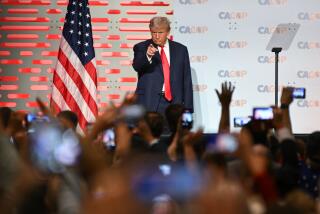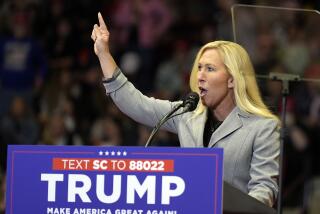Presidential Primary to Replace Caucuses in Washington State
- Share via
OLYMPIA, Wash. — Lawmakers agreed Friday that the state will have a primary election instead of the current caucus system when it is time to elect a President in 1992.
The state Senate overwhelmingly approved Initiative 99, which was approved several weeks ago in the House. Because both legislative branches supported the measure, it will not have to be submitted to voters in November and will not require the signature of Gov. Booth Gardner.
Robertson a Factor
The breakthrough in eliminating caucuses after about 20 years of trying resulted in large part because supporters of religious broadcaster Pat Robertson took control of Republican caucuses and the state party conventions last year in spite of his poor showing in public opinion polls.
The 38-10 vote in the Senate was a victory for Secretary of State Ralph Munro, who has been pushing for a presidential primary for several years.
“I am absolutely ecstatic,” Munro, the state’s chief elections official, said after the Senate vote. Although opponents of the initiative grumbled about some of its provisions, Munro said that there is plenty of time to amend the bill before the next presidential election year.
As approved, the initiative gives the secretary of state the right to work with election officials in Oregon, Idaho and Montana to establish a regional presidential vote.
Munro said that the four states would have much more clout in the election process with a unified primary election rather than “howling like lone wolves on their own.”
He predicted that at least 1 million voters would participate in the 1992 presidential primary in Washington, far more than 50,000 and 60,000 voters who turn out for caucuses.
Boat Shows Fared Better
Munro said that more people attended boat shows in the state in 1988 than went to party caucuses.
Opponents of the primary include state Sen. Neil Amondson, who said voters will not like the fact that they have to choose a partisan ballot in order to participate in the presidential primary.
Voter registration and participation in all other elections will remain nonpartisan, as it is now.
More to Read
Get the L.A. Times Politics newsletter
Deeply reported insights into legislation, politics and policy from Sacramento, Washington and beyond. In your inbox twice per week.
You may occasionally receive promotional content from the Los Angeles Times.










